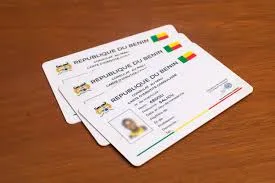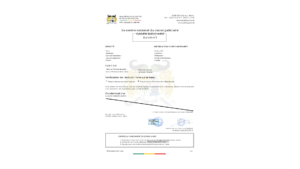If you’re a student in the Benin Republic, navigating the residency requirements can be challenging. However, one document stands out for simplifying your journey—a consular card. In this guide, we’ll show you how to effortlessly get a consular card as a student in Benin Republic, covering all the steps, requirements, and benefits to ensure a smooth process.
Table of Contents
- What Is a Consular Card?
- Why Do Students Need a Consular Card in Benin Republic?
- Eligibility for Getting a Consular Card
- Step-by-Step Guide to Getting a Consular Card
- Frequently Asked Questions
- Conclusion: Your Next Steps

How to Get a Consular Card as a Student in Benin Republic
What Is a Consular Card?
A consular card is more than just an identification document; it is a lifeline for students navigating life in a foreign country like Benin Republic. Issued by your country’s consulate or embassy, this official document serves as proof of your identity and nationality while granting you access to essential services.
For students, the consular card acts as a bridge between your home country and your new environment, offering convenience, security, and peace of mind. Let’s explore its significance in greater detail:*

1. Reduces the Need to Carry Sensitive Documents
Carrying your passport everywhere is risky, especially in a foreign country. A consular card eliminates this concern by providing:
- Convenience: With the card, you have a compact, lightweight form of identification, so you don’t need to lug around your passport or other sensitive documents.
- Reduced Risk of Loss: Passports are expensive and time-consuming to replace if lost. By carrying a consular card instead, you minimize the chance of losing such a critical document.
- Security: In case of theft, losing your consular card is far less problematic than losing your passport, as the card’s replacement process is typically quicker and easier.
For students who often need to present identification for various purposes, such as school registrations or housing agreements, the consular card provides a safe and reliable alternative.
2. Simplifies Access to Government Services
Navigating local government systems can be daunting for foreign students, especially if you don’t speak the local language fluently. A consular card simplifies these interactions by:
- Providing Recognized Identification: Many government offices and agencies in Benin Republic accept consular cards as valid forms of ID, eliminating confusion or delays.
- Supporting Legal Processes: Whether you’re applying for a student permit, residency renewal, or other legal documents, the consular card serves as proof of your nationality and legal status.
Having a consular card on hand ensures smoother communication and faster service when dealing with administrative tasks.
3. Facilitates Access to Educational Opportunities

As a student, you’ll need to present identification regularly for academic purposes. The consular card helps you:
- Enroll in Schools and Programs: Universities and training institutions may require proof of nationality, which your consular card provides.
- Verify Your Student Status: If your consulate collaborates with educational institutions, the card may include information about your student enrollment, simplifying verification processes.
This streamlined access can save you time and effort, especially during critical periods like registration or examinations.
4. Eases Travel Within Benin Republic
Traveling within the Benin Republic or across neighboring countries often requires identification. The consular card makes travel easier by:

- Serving as Local Identification: Whether you’re booking a hotel, passing through a checkpoint, or registering for events, the card is widely accepted as valid ID.
- Avoiding Passport Wear and Tear: Using your consular card for everyday travel keeps your passport in pristine condition, ready for international trips.
- Facilitating Intercity Travel: Students traveling between cities for study or leisure can rely on their consular card to avoid complications at security checkpoints.
This convenience is particularly useful for students who frequently move between campuses, internships, or field studies.
Additional Benefits for Students
- Health Services: Some consular cards are linked to health or insurance programs, providing access to medical services or discounts.
- Banking and Financial Transactions: Many local banks require identification to open an account or process transactions. A consular card is often accepted as proof of identity and residency, making it easier to manage your finances.
- Community Support: Your consular card connects you with fellow nationals and opens doors to consular-organized events, workshops, and support networks.
Why Do Students Need a Consular Card in Benin Republic?
As a student, having a consular card offers several benefits:
- Simplified Residency Processes
- Makes renewing student permits easier.
- Acts as proof of nationality when applying for school-related benefits.
- Access to Emergency Support
- In emergencies, your consular card allows your embassy to identify you quickly and provide assistance.
- Financial and Legal Benefits
- Essential for opening bank accounts.
- Provides legal protection in disputes or emergencies.
Eligibility for Getting a Consular Card
To apply for a consular card as a student in Benin Republic, you must:
Meet any additional requirements specified by your consulate.
Be a national of the issuing country.
Be enrolled in an accredited educational institution in Benin Republic.
Provide valid proof of identity, such as a passport or national ID.
Step-by-Step Guide to Getting a Consular Card
Follow these steps to get your consular card as a student in Benin Republic:
Step 1: Gather Required Documents
Prepare the following documents:
| Document | Details |
|---|---|
| Proof of Identity | Passport, national ID, or birth certificate. |
| Student Enrolment Verification | Admission letter or school ID from your educational institution. |
| Passport Photo | A clear, professional photo on a white background. |
| Residential Address in Benin | Proof of your current residence, such as a utility bill. |
| Signature on White Paper | Clear signature on white A4 paper (photographed or scanned). |
Step 2: Take a Professional Passport Photo
A high-quality passport photo is a critical requirement for your consular card application. To ensure your photo is accepted:
- Be Recent and Clear:
- The photo must be taken within the last six months to reflect your current appearance.
- Avoid blurry or pixelated images; the photo must be sharp and well-lit.
- Plain White Background:
- A neutral, white background is mandatory to meet international ID photo standards.
- Avoid shadows or distracting elements in the background.
- Meet Standard Specifications:
- The photo size should match the standard passport photo dimensions (usually 2×2 inches or as specified by your consulate).
- Ensure your face is centered and fully visible, with a neutral expression.
- Remove hats, sunglasses, or other accessories unless worn for religious or medical reasons.
A professional photo studio can help you meet these criteria, ensuring your photo is compliant with consular requirements.
Step 3: Prepare Your Signature
Your signature is another key component of your consular card application. Here’s how to prepare it correctly:
- Use a White A4 Sheet:
- Write your signature on a clean, white A4 sheet to ensure clarity.
- Avoid folds, smudges, or extraneous marks on the paper.
- Make It Legible:
- Ensure your signature is bold and clear, as it will be digitized for use on your card.
- Use a dark ink pen (preferably black) for maximum visibility.
- Capture a Clear Image:
- Take a high-quality photo or scan the signature using a smartphone or scanner.
- Save it in a common format like JPEG or PNG for easy submission.
Double-check your scanned or photographed signature for clarity before submitting it to the consulate.
Step 4: Visit the Consulate
Once your documents and requirements are ready, the next step is to visit your country’s consulate in Benin Republic. Here’s what to do during your visit:
- Submit Required Paperwork:
- Present all documents, including your passport photo, signature, and application form.
- Ensure your documents are complete to avoid delays in processing.
- Verify Application Details:
- Double-check the information on your application form with the consulate staff.
- Correct any errors immediately to prevent issues with your consular card.
- Inquire About Processing Times:
- Ask the consulate about the expected timeline for processing your card.
- Most consulates provide clear timelines, typically 3–7 working days.
Step 5: Pay the Processing Fees
Most consulates charge a fee to issue a consular card. Follow these steps to complete the payment:
- Know the Fee Amount:
- Check with the consulate to confirm the exact fee for your application.
- Fees vary by country, so ensure you have the correct amount.
- Choose a Payment Method:
- Bank Transfer: Make the payment directly to the consulate’s designated account. Keep the transaction receipt as proof.
- Cash Deposit: Some consulates accept cash payments at their offices. Ask for a receipt after payment.
- Online Payments: If the consulate supports online payment options, ensure you follow their instructions carefully.
- Obtain Payment Confirmation:
- Always request a receipt or acknowledgment of payment for your records.
Step 6: Collect Your Consular Card
After your application has been processed, it’s time to collect your consular card. Follow these steps:
- Wait for Notification:
- The consulate will notify you when your card is ready for collection, either via email, SMS, or a phone call.
- Visit the Consulate:
- Bring a valid ID or your payment receipt as proof when collecting your card.
- Arrive during the consulate’s working hours to avoid delays.
- Double-Check the Details:
- Before leaving, verify that the details on your consular card—such as your name, photo, and signature—are accurate.
- If you spot any errors, notify the consulate staff immediately for corrections.
Frequently Asked Questions
Q1. Can I use the consular card for international travel?
No, the consular card is not a travel document. Use it alongside your passport.
Q2. How long is the consular card valid?
The validity depends on your consulate but typically ranges from 1 to 5 years.
Q3. How much does it cost?
Fees vary by consulate. Contact yours for details.
Q4. What happens if I lose my consular card?
Report the loss immediately to your consulate. They’ll guide you on how to get a replacement.
Q5. Is the consular card mandatory for students?
While not mandatory, it simplifies legal and administrative processes, making it highly recommended.
Conclusion: Your Next Steps
Getting a consular card as a student in Benin Republic is a straightforward process that ensures your safety, legal security, and access to vital services. Don’t delay—start your application today!

Need Assistance? Let Us Help!
At Campus Benin, we provide step-by-step guidance to simplify your consular card application.
📞 Call: [+22994711553]
📱 WhatsApp: [+22953836082]
🌐 Visit: campusbenin.org
Get your consular card ready in just 3 to 7 working days—contact us now!
See More Related: https://campusbenin.org/how-to-obtain-a-benin-republic-police-character-for-nigerians/


